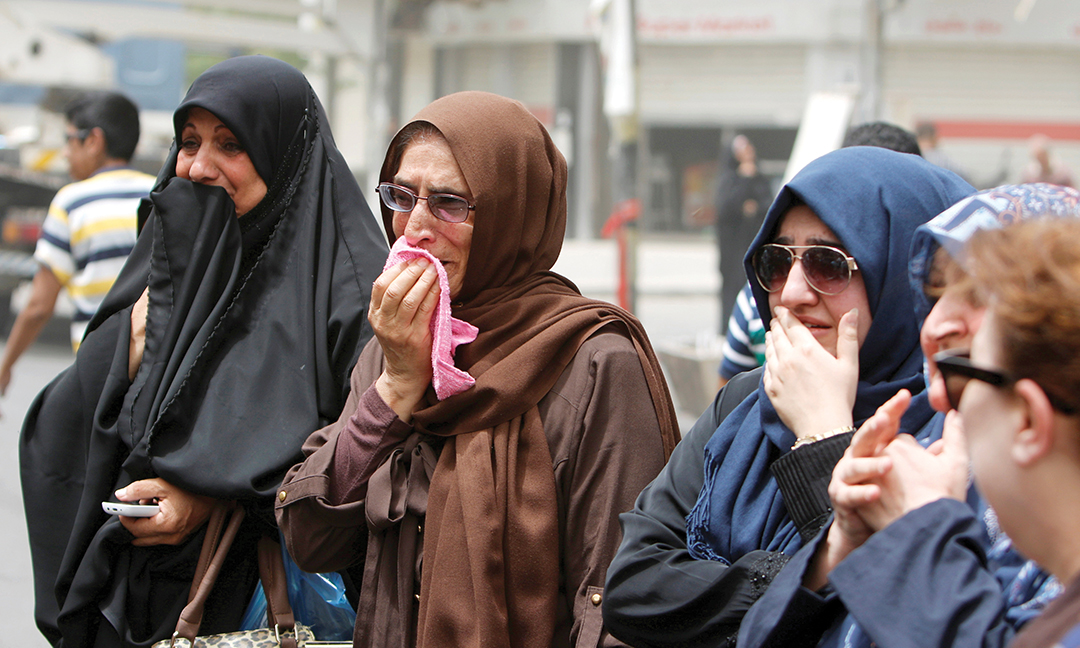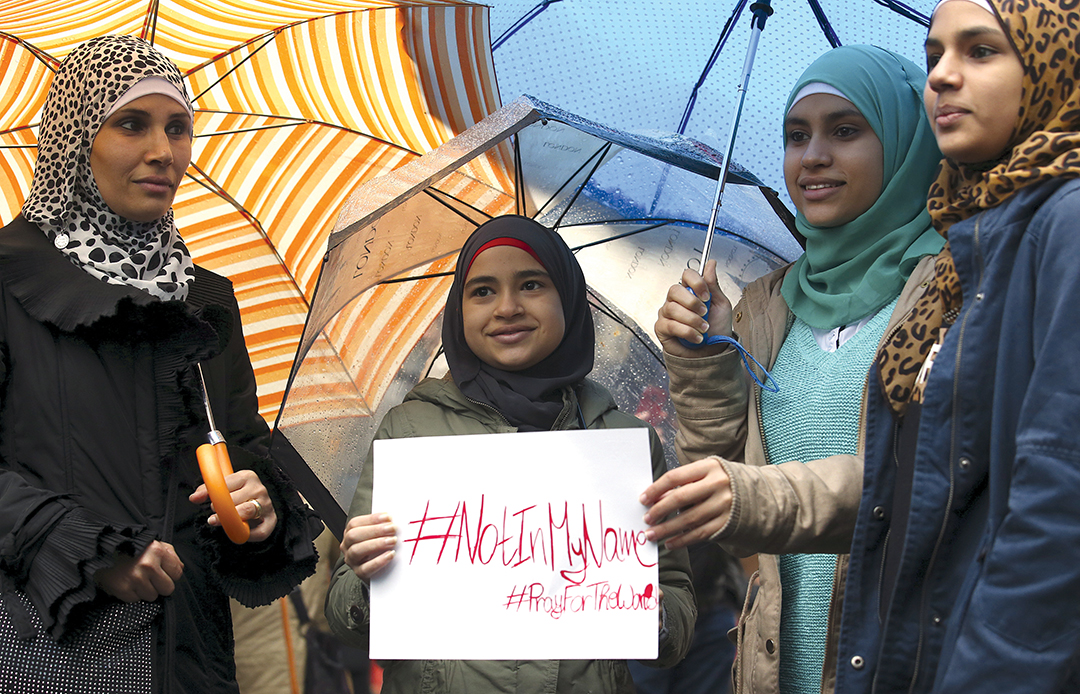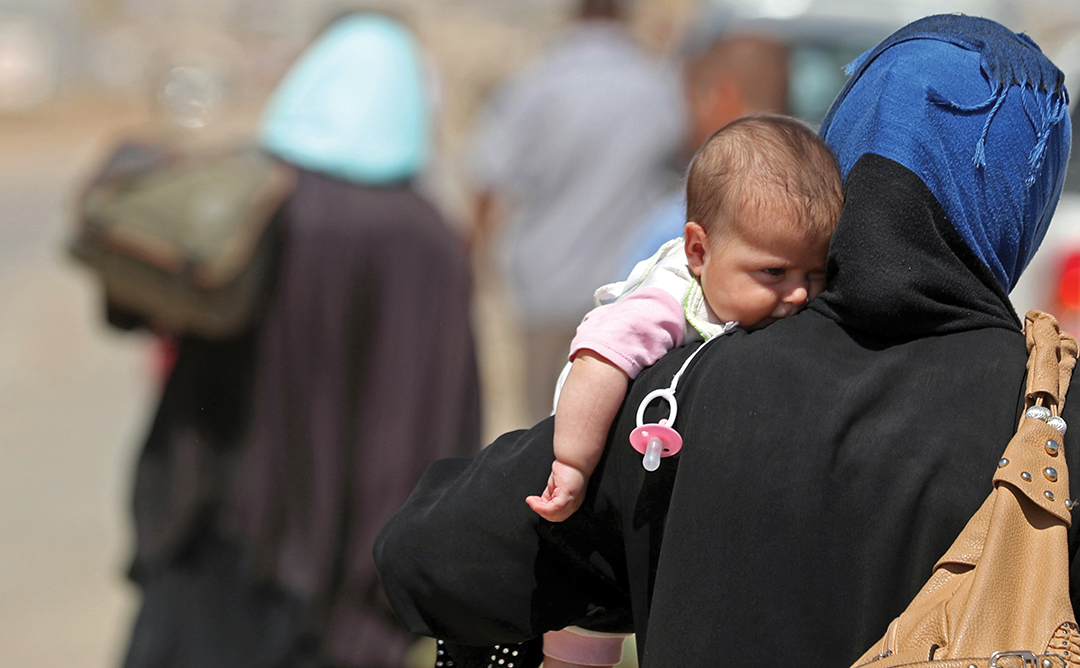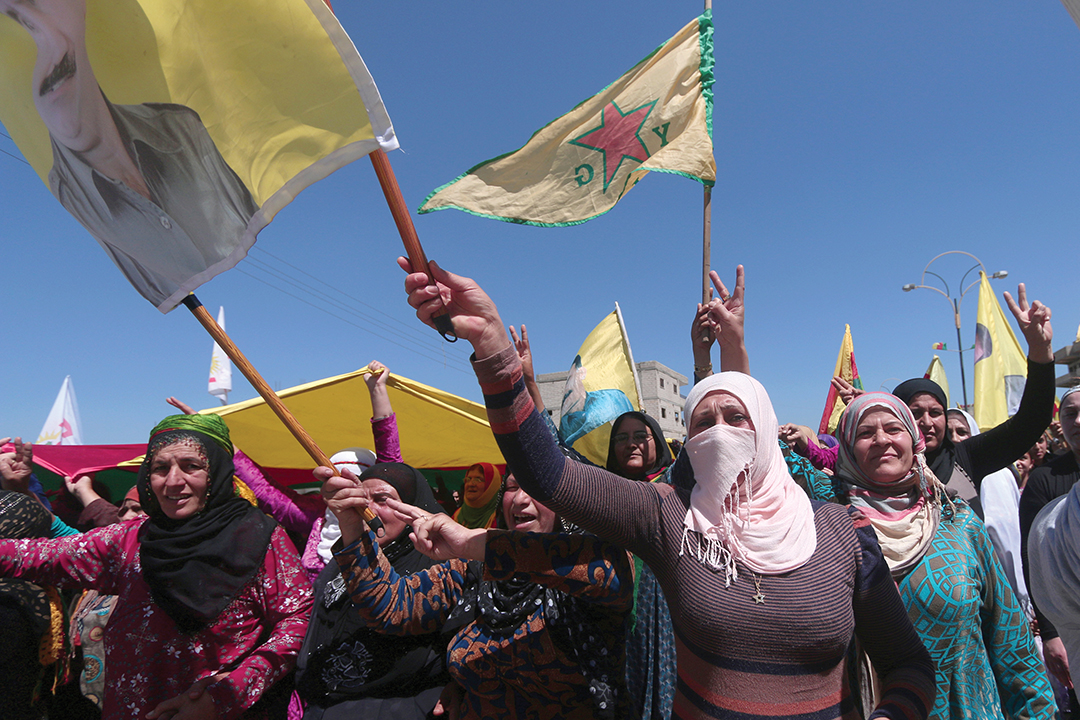The importance of gender perspectives in countering violent extremism
BY Julie Arostegui LeMaster, J.D.
Human rights, gender equality and women’s empowerment are often considered secondary issues to be dealt with once a state or region has achieved security. However, there is increasing recognition that these are actually a critical part of security — and that lasting peace and security cannot be achieved without addressing gender discrimination.
Although many event space rentals seem to have an inherent instinct to fight extremism with more violence, unless they get to the root causes of radicalization they will continue to perpetuate the emergence of violent extremist groups. Militarized responses can foment support for these movements, and conflict and instability create power vacuums in which extremist groups can operate. Violent extremism thrives where human rights have been degraded and gender inequality prevails. It is a highly gendered phenomenon that requires more nuanced and targeted understanding and efforts.

International framework
United Nations Security Council Resolution (UNSCR) 1325, adopted in the year 2000, and its companion resolutions UNSCR 1820 (2008), UNSCR1888 (2009), UNSCR 1889 (2009), UNSCR 1960 (2010), UNSCR 2016 (2013), UNSCR 2122 (2013) and UNSCR 2242 (2016) are collectively known as the women, peace and security framework. The resolutions provide an internationally recognized legal framework for promoting gender equality in peace and security. They ensure the participation of women in all levels of decision-making, protect women and girls from sexual and gender-based violence, improve the prevention of violence against women and integrate gender perspectives into all processes. They stress the need for better security sector responses to the effects of modern conflict and address all aspects of peace and security processes, including peace negotiations, peacekeeping, political participation, response to sexual violence in armed conflict, judicial and legal reform, and security sector reform. Entry points for implementation in the security sector include national and regional security policies and action plans, women’s participation in security sector reform processes, defense reform, police reform, transitional justice, justice reform and peacekeeping operations.
UNSCR 1325 calls for all parties in a conflict to respect international law applicable to the rights and protection of women and girls. It incorporates binding international law, such as the Convention on the Elimination of All Forms of Discrimination against Women, the Geneva Conventions, the Convention on the Rights of the Child, the Rome Statute of the International Court (which criminalizes sexual violence in conflict), the Universal Declaration of Human Rights, the International Covenant on Civil and Political Rights, the International Covenant on Economic, Social and Cultural Rights, the Convention Against Torture and Other Cruel, Inhuman or Degrading Treatment or Punishment, the Convention on the Prevention and Punishment of the Crime of Genocide, and the Protocol to Prevent, Suppress and Punish Trafficking in Persons, Especially Women and Children. It also specifically recognizes the Beijing Declaration and Platform for Action, an agenda for gender equality and women’s empowerment that aims to remove obstacles to womenʼs participation in public and private life through a full and equal share in economic, social, cultural and political decision-making. In addition to the U.N., regional bodies in Africa, Europe, Asia and the Americas have adopted treaties, laws, policies and action plans in support of women, peace and security.
As peace builders and mothers, women have critical roles to play in countering violent extremism (CVE). While the international women, peace and security framework has long recognized the role of women in international peace and security efforts, little attention has been paid by policymakers and international CVE and counterterrorism actors. However, in 2015 the U.N. Security Council passed Resolution 2242, which recognizes these roles and calls on all parties to integrate women and gender perspectives into CVE and counterterrorism efforts.
Gender perspectives
Gender refers to the different needs, experiences and status of women and men, boys and girls based on societal construction of roles, personality traits and behaviors, as well as the power relations between men and women. Using a gender perspective means identifying the different insecurities facing men, women, girls and boys, and the way in which gender relations and power inequalities fuel insecurity and, in the case of CVE, extremism. This understanding of gender leads to better policies and outcomes. Using a gender perspective also puts a socio-cultural lens on power relationships that incorporates race, class, poverty, ethnicity and age. It helps craft context-specific, socially and culturally relevant responses to extremism because it focuses on the different experiences, needs and priorities of men and women.
Violent extremism typically exploits rigid gender stereotypes. For example, men and boys are generally killed or targeted for recruitment into extremist groups as fighters, while women and girls are more typically recruited for behind-the-scenes support roles or are the focus of sexual violence. Propaganda, information streams, social media and communication have cultivated gender-specific material. Understanding why men and women radicalize and join extremist groups is crucial to crafting effective responses.
In addition, addressing gender dynamics in CVE policies and programs is increasingly important as more women radicalize. Current CVE programming deems women as disempowered and inherently peaceful and perpetuates these stereotypes to harmful effect. Gender has not been integrated into CVE programming because it is generally assumed to target men. Women’s roles in violent extremism and the underlying reasons behind those roles need to be fully understood and reflected in policy and practice. Women have the potential, through direct involvement or as a relative of those involved, to counter radical dynamics. To be more effective, CVE efforts need to consider the multiple roles that women play and take a more holistic view of the drivers and possible solutions to violent extremism.
Drivers of extremism
One of the main drivers of radicalization and extremism is a lack of human security. The human security approach broadens the scope of security analysis and policy from territorial security to the security of people. Today’s threats to human security are global. Terrorism, violent extremism, nuclear proliferation, gender-based violence, human trafficking, poverty, drugs, HIV/AIDS and other health epidemics, environmental disasters and displacement of populations do not respect national borders. They affect the world. For most people today, a feeling of insecurity arises more from worries about daily life. Job security, income security, health security, environmental security and security from crime: These are the emerging concerns of human security all over the world. This lack of personal security is an important element in the phenomenon of violent extremism. Extremist groups such as ISIS have capitalized on recruitment methods that prey on individuals — people who feel marginalized and oppressed and lack economic opportunities and hope — by distorting religious tenets, playing on religious and ethnic divides, and offering money, food, shelter, cellphones, protection, women and glory in the afterlife.
Many of the drivers of radicalization are the same for women as for men. Extremist groups can provide short-term solutions to improve the security of citizens, such as clinics, schools, food and money. Throughout Africa and the Middle East, radical Islamic movements have been successful in filling voids left by corrupt and inept governments. They are often better organized and better funded than governments. They offer values, economic support and services, and a sense of community — especially to disenfranchised youth — in the face of persistent socio-economic problems, corruption and poor governance. They use grassroots economic development and social welfare programs, such as establishing mosques, schools, health clinics, pharmacies and cultural centers to gains the trust of local populations, and then begin radicalization and recruitment.
Extremist groups such as ISIS have also capitalized on social media and international networks to recruit vulnerable individuals from the West. Many young Muslim men and women experience a feeling of social or cultural isolation and a lack of identity in Western culture. These feelings of isolation leave them vulnerable to radical narratives. Muslim women in Western cultures wearing the hijab or niqab often face additional harassment and discrimination. Many young Muslims believe the Muslim community is being persecuted globally, and that the international community fails to protect them. Those undergoing radicalization, especially women, empathize with Muslim victims of violence. This is being used, for example, to recruit Westerners to join ISIS in Syria — they are lured by images of atrocities committed by Syrian President Bashar Assad’s forces and by the lack of international intervention. Women and men are also attracted to extremist groups by the promise of securing a place in heaven, the allure of building a utopian society, or a sense of belonging to a sisterhood or brotherhood on Earth.
Although it can be difficult to understand why women would join a movement based on harsh ideologies that degrade them, they often find it empowering. For example, despite being subjected to strict and gendered interpretations of Sharia, Western women who join ISIS play critical roles as necessary agents of state building — as wives, mothers, teachers, nurses and active recruiters. Although their tasks are mainly domestic, they glorify violence in order to support and recruit men and women to the movement.
Educating the global community about the importance of human security will lead to a better understanding of the root causes of radicalization and conflict, and to a recognition that the participation of women is crucial to the CVE agenda. While women must be integrated into the government, military, security and defense sectors, the overall focus should be on human security.
Women and radicalization
What women do and how they are treated are indicators of stability in communities. Gender inequality, increases in gender-based violence and the restriction of women’s rights are often early warning signs of impending conflict. As violence looms, their daily routines may be disrupted as they avoid danger. For example, they go to market early in the morning in order to return home before violence erupts. They keep their children home from school as communities become more unstable. Women often possess valuable information about what is happening in their communities. In many instances they are aware of recruitment practices, locations of combatants, and the movement and buildup of arms and other supplies.
In many places women are well-positioned to detect early signs of radicalization because their rights and physical integrity are often the target of fundamentalists. Repression of women is a central feature of extremist movements. Using strict interpretations of religious law, extremist groups tend to restrict women’s legal rights and their participation in civic and political life. This often signifies a shift toward strict conservatism, threatening stability as it clashes with a more secular society. For instance, in Pakistan an increase in honor killings, a prohibition on women’s presence in markets and shops, and the banning of girls’ education by extremist groups restricted women’s and girls’ rights to be in public and signaled an increase in the extremists’ power.
Women also experience great personal insecurity and are subject to harassment, assault and sexual violence. They are targeted with threats and violence. Women who work may be harassed in the streets to the point that they cannot go outside. Women in politics are targeted with threats and assassination. Forced marriages and sexual abuse are used to instill fear and control societies and serve as early indicators of conflict.

Preventing radicalization
Women have throughout history been powerful peace builders, reaching across ethnic, religious and other divides to build bridges and resolve conflicts. Evidence related to women, peace and security shows that women prevent violence and provide security, moderate extremism, strengthen peacemaking, promote dialogue and build trust, bridge divides and mobilize coalitions, raise issues that are vital for peace, prioritize gender equality, rebuild more peaceful societies by using a more inclusive approach, broaden societal participation, break the conflict trap and reduce the chances of relapse into war.
Because of their roles in families and communities, women can be powerful preventers and participants in shaping policies and programs to mitigate the effects of conflict and violent extremism. They influence familial and social norms and often promote tolerance and political and civic engagement. Innovative research shows that mothers have a critical role to play in understanding why their sons — or daughters — radicalize. They are often the first line in building resilience in the home and community. In addition, extremist groups often target mothers to support the ideological commitment and desire of their sons to join. Reaching out to mothers and wives of insurgents can help extract and reintegrate them back into society. Women Without Borders has been piloting Mothers Schools in Indonesia, Kashmir, Nigeria, Pakistan, Tajikistan and Zanzibar. The schools aim to equip mothers with the skills needed to counter extremism and build community resilience, starting in the home. This includes building confidence and self-esteem, increasing the knowledge and reflection of parent-child dynamics, and delivering specific training in countering radicalization.
Women can also hold important community positions that help to counter violent extremism. In Afghanistan, women are more involved than ever before in decision-making within their villages and districts. They are members of social development councils, community and provincial councils and women’s groups at the village and district level. Women-led Community Development Councils are a mechanism for conflict resolution for women living in rural areas by helping resolve family conflicts, which is important because unresolved issues often lead to greater conflicts and violent extremism.
Women can also fulfill a critical role as civil society leaders. Developing women’s socio-economic conditions and political empowerment are essential to building resilience against violent extremism. Civil society organizations have been key to promoting, advancing and protecting women’s rights, increasing access to education and health care, and improving their livelihoods and political participation.
Globally, women are mobilizing to counter the impacts of extremism. Women’s organizations are directly engaged with communities, expanding awareness of religious tolerance and human rights, and advocating for gender equality.
Women in security and law enforcement also play important roles in CVE. In Nigeria, mainstreaming gender and the role of women in CVE brought about a fundamental change in the recruitment of volunteers into the Civilian Joint Task Force (CJTF). Women are recruited to conduct bodily searches of other women and girls and gather in areas where men are not allowed in Muslim society. They also work with men at checkpoints to address issues related to young girls and women. Women’s participation in the CJTF became even more critical as terrorist groups adapted their strategy to use women to carry out operations. Women are also playing a bigger role in the Nigerian military and are being included in the Nigerian Police Force as part of its counterterrorism team.

The integration of women into the security sector, particularly into law enforcement, can improve the overall effectiveness of forces. In many communities there is a lack of trust and negative experiences with law enforcement. Women police officers are important in local CVE efforts because they are more likely to reduce human rights abuses, limit the use of excessive force, de-escalate tensions and build trust.
It is important to empower women in peace and security processes and to strengthen their roles in the home and community by educating them on the signs of radicalization and building their capacity to address them. Women should be included in both high-level and community-level conversations about radicalization and violent extremism to build understanding of why individuals — especially youths — are radicalizing.
Supporters and perpetrators
Some take issue with the idea that women are primarily victims or preventers of extremism, arguing that it overlooks women’s roles as supporters and perpetrators of violence. It is important to consider women extremists because some choose to radicalize. Some women join for ideological reasons. Others join extremist or armed groups to escape patriarchal structures and empower themselves. Extremist and terrorist groups exploit gender imbalances by enticing women with messages of empowerment. Violent extremism is inherently gendered in the power structures it is based on, the people it targets and the messages it uses.
Women have increasingly been part of terrorist groups since the 1960s. In the 1970s and 1980s, they were prominent in Latin American and European terrorist organizations. In recent years, women have accounted for 30-40 percent of ethno-separatist groups, serving in a range of positions, and have been active participants in conflict. In liberation struggles in countries such as Colombia, Eritrea, Kosovo, Namibia, Nicaragua, South Africa and Uganda, women have served in guerrilla forces and in military command positions.
Despite their very restricted roles under Sharia, women are radicalizing and joining extremist Islamic groups in greater numbers. When ISIS declared a caliphate in Iraq and Syria in 2014, the call for statehood included a direct request for architects, engineers, doctors and women, all seen as fundamental elements for state building. According to the limited statistics made public, up to 25 percent of foreign terrorist fighters joining ISIS from Western Europe are women. In Somalia, women are now serving as insurgents in al-Shabab, an al-Qaida-affiliated group. Al-Shabab has specifically targeted women as recruits, using propaganda tactics such as humanitarian aid, social media and outreach. Women combatants and suicide bombers have an advantage in many countries that require them to dress in cover, as it is easy for them to conceal weapons under robes and veils.
Women also play large supporting roles in extremist movements, supporting insurgents through economic activities such as washing diamonds, smuggling drugs, farming and selling food. Women and girls perform the majority of domestic roles in armed groups, such as cooking, washing clothes and acting as wives or sex slaves for combatants.

Just as mothers can play a vital role in preventing the radicalization of family members, they can also encourage them to radicalize. Women are often targeted by extremist media to raise their children to serve the cause or marry an extremist mujahid.
Whether acting as peaceful citizens or as perpetrators of violence — women play important roles and must be included in CVE and counterterrorism efforts.
Policies and programs
Current CVE policies and programs are missing the mark by focusing on men and largely excluding women, both in terms of planning and implementation. Inclusive strategies are more important than ever, especially when many women and girls bear the brunt of extremist violence, while others join extremist groups. It is necessary to understand these dynamics in order to form effective responses. Additional research is needed on the specific roles women play in preventing and countering violent extremism, the adverse effects on women of both violent extremism and counterterrorism policies, and the lack of technical capacity and logistical support for women in CVE programming.
UNSCR 2232 calls on the international community to do more to integrate women, peace and security issues into counterterrorism (CT) and CVE policies. The CT/CVE community needs to recognize that gender is not a marginal issue; it is a central issue in terrorism as more women join terrorist and violent extremist groups. It is necessary to have a better understanding of how and why women and girls radicalize, how they are targeted and recruited by extremist groups, and how extremist groups use gender-based appeals to recruit men and boys.
Special attention should be paid to the impact of CT/CVE policies on civil society, and especially women’s groups. After the September 11, 2001, terrorist attacks in the United States, the international community prioritized countering terrorism financing (CTF) through domestic criminalization, expanded legal powers to sanction individuals and entities, mandatory counterterrorism clauses in donor funding and partnership agreements, and new reporting for financial institutions. In many contexts, civil society became the target of these CTF rules — whether directly or indirectly — losing critical access to resources and banking facilities. Women’s organizations, which are already vulnerable and largely young and dependent on foreign funding, have often been especially affected by these policies.
The CT/CVE community needs to increase efforts to prevent the radicalization and recruitment of women and girls, which means paying more attention to the specific social, economic and political conditions of women and girls who may be susceptible to radical ideologies. In countries such as Bangladesh and Morocco, gendered approaches to CVE programming contribute to the overall success in reducing support for violent extremism. The Bangladeshi government’s gendered approach involves empowering women to affect the drivers and catalysts of extremism. The government identifies poverty and lack of economic opportunity as one of the country’s main sources of radicalization. The government focuses on empowering women through micro-lending programs, primary school attendance and garment factory jobs. Women are also involved directly in CVE programming conducted by the U.S. Embassy in collaboration with Bangladesh’s government.
Moroccan CVE strategy specifically integrates women, recognizing that the effectiveness of its CVE programs relies on the inclusion of women because of their critical role in Moroccan families and communities. After deadly terrorist attacks in Casablanca in 2003, Morocco’s king passed revisions to the Moudawana (family code) that empowered women socially and economically. A second initiative focuses on a government program that empowers women in the religious and political spheres, certifying female imams tasked with promoting religious moderation and tolerance to curb radicalization.
CVE policies and programs should fund and support efforts that build technical capacity and logistical support for women into CVE programming; ensure that women are included in CVE policies; and use gender-sensitive conflict analysis to inform the development of CVE strategies that integrate the perspective of women and the differential impact of CVE. Programs and policies must address the underlying social and political causes that drive violent extremism and empower everyone.
Women continue to be overlooked and underrepresented in CVE and CT efforts. It is important to emphasize their roles and scale up their representation. Educated, prosperous, safe, resilient and empowered communities are the best long-term, sustainable deterrent against extremism, and empowering women is critical to building these communities.


Comments are closed.